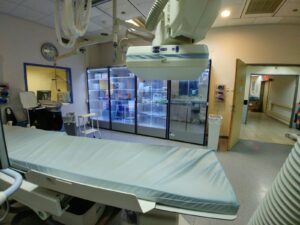Sheba Medical Center – Installation of 60 Total Sense Cabinets
Sheba Medical Center is a world-renowned, 1,700-bed hospital in Israel that treats one million patients a year. It was ranked the 10th best hospital in the world by Newsweek and has a philosophy of continual improvement. The hospital reached out to IDENTI as part of their efforts to manage the catheter labs and high-value medical supplies. They wanted to put better systems in place to ensure that no device expired before it could be used and that their full range of products would be available when needed.
The goal was to move from manual inventory management to an automated system that could provide real-time data on the medical supplies in stock and those removed for procedures. The Sheba team hoped that this would eventually pave the way towards the more cost-effective and efficient system of consignment inventory management. By deploying Total Sense Cabinet comprehensive systems, we were able to meet all the needs of the hospital and the project was deemed a success.
The Mission
Sheba Medical Center was looking for a way to more effectively manage the storage, tracking and procurement of implants and other high-value medical consumables. They wanted to take pressure off busy staff by improving cumbersome workflows, as well as make financial savings by shifting to a consignment program – allowing payment of supplier products only as they are used.

The Challenge
Sheba Medical Center has an expansive Invasive Cardiology unit, the largest of its kind in Israel, that houses five well-equipped cardiac catheterization laboratories and one laboratory for pacing and electrophysiology. Each year more than 3,000 patients undergo catheterization in this unit, which stores large volumes of high-cost medical implants.
Prior to IDENTI’s involvement, inventory management was a manual process and the hospital had identified many issues that needed to be addressed:
- lack of effective expiry management
- time consuming and inefficient workflows
- poor stock visibility leading to shortages and surpasses
- wastage was too high
- vendor discrepancies were common
The hospital lacked accurate usage data and this resulted in unreliable stock control:
Hani Hag-Yihye, Sheba’s Senior Nurse for Invasive Cardiology: “Sometimes, we had a shortage of popular sizes of implants or wires or, in other cases, an excess that caused us to waste money.”
With poor visibility of supply levels and inefficient inventory tracking there were regular disagreements on usage data with vendors. Reconciling inventory against claims with suppliers was a time-consuming task:
“The medical team invested a great deal of effort and time in continuous communication with the suppliers and reconciling inventory against claims from suppliers, which included countless faxes and correspondences” Hag-Yihye says.
The hospital sought user-friendly technology that would address the catheter laboratory’s inventory-management challenges and improve the supply chain.

The Chosen Solution
IDENTI’s team mission was to improve Sheba’s supply chain inefficiencies by helping them to gain full visibility and control of their high-value medical supplies. The system needed to be interoperable, automated and easy to use. After an in-depth evaluation of the issues being experienced by Sheba Medical Center, the IDENTI’s team recommended the Total Sense system, as this would result in 100% traceability and add reliability to Sheba’s inventory management process.
IDENTI’s Total Sense Cabinet, which manages tissue and implant inventory and consumption, and features the real-time and simultaneous communication of data to both hospital and supplier systems, made it a good solution. The Total Sense smart storage cabinet has in-built RFID readers and antennae, providing full inventory tracking and stock control. The system stores all product details, including expiry date, batch/lot, serial no. and manufacturer’s SKU.
The smart cabinet connects to the cloud, enabling fast, seamless integration with hospital clinical software, such as MMIS, ERP and EHR.
The Process
Sheba installed more than 60 Total Sense Cabinets in various departments, including Electrophysiology, Angiography, Neurology, Vascular, the Cath Lab and Gastro.
The largest installation was in the Heart Treatment and Research Center, where 30 cabinets were installed to manage the storage and status of all implants for Sheba’s diagnostic, therapeutic and preventive cardiovascular units. These include intensive and intermediate cardiac care, catheterization, heart failure, electrophysiology, cardiac pacing, non-invasive cardiology, nuclear cardiology, cardiac imaging, cardiothoracic surgery, vascular surgery and cardiac rehabilitation.
IDENTI worked in partnership with Sheba to establish the best location for cabinets and also reviewed the products and item sizes used in different areas of the hospital. Cabinets can include hanging space, shelving set at different heights and drawers in different positions. IDENTI ensured that the design of the cabinets was carefully thought through, resulting in custom-made cabinets that suited the specific storage requirements of each department.

Using the Total Sense Cabinet
With the new system in place, incoming supplies are now tagged by vendors or at the hospital’s Distribution Center. Products such as stents or implants, which tend to arrive directly to the cath lab and ep lab, have pre-coded tags, so these items can go straight into a cabinet.
As smart cabinets store high value items, they have security controls in place that require nurses to use their RFID badges to gain access. The smart cabinet also keeps track of all items taken or returned to the cabinet broken down by individual staff member.
As each item is removed from the Total Sense Cabinet, the RFID reader and antennae capture its unique tag ID and forward this data to IDENTI’s cloud-based software. This then identifies the product, capturing full details, including the manufacturer and expiration date. This full data capture not only ensures that the hospital is complaint with GS1 and UDI regulations but also facilitates full charge capture and maximum reimbursement.
The Results:
Sheba Hospital has gained better oversight of its tissue and implant inventory. The team have been able to use data insights to improve their stock management and regain control of their medical supplies.
The introduction of the IDENTI Total Sense Cabinet resulted in many benefits for Shaba.
- The hospital has reduced the cost of excess inventory by between $2-3 Million.
- The hospital was able to shift to 100% consignment and all inventory management is now on one central digital platform that is shared with suppliers, achieving full traceability and joint responsibility for the managed inventory.
- The hospital has dramatically reduced disputes with vendors regarding item consumption (Close to zero).
“First, we moved to full, pay-per-use consignment. Second, we do not need to deal with the inventory levels—each vendor is managing his inventory by himself remotely.”
- The hospital reports that the system works autonomously and has resolved several manual process-based challenges, the charge capture rate increased by 87% for the managed items.
- The amount of waste related to discarding expiring items has dropped to zero.
- The ability to manage expired items has improved dramatically and today Sheba has full control over their medical inventory and the cabinets include 0 expired items.
“In general the system enabled me to deal more with my team, my patients and my medical work, and not to run after administrative tasks, logistics and supplier disputes.”
Sheba Medical Center asked IDENTI to help them improve their control and management of tissue and implant inventory. The introduction of 60 Total Sense Cabinets was very successful and has provided benefits in many areas.

The Bottom Line and Future Expansion
Since their consultation and discussion of inventory management problems with IDENTI, Sheba has installed more than 60 Total Sense Smart Cabinets in various departments, including electrophysiology, angiography, neurology, vascular, the cath lab and gastrology.
The largest installation has been in the Heart Treatment and Research Center, in which 30 cabinets are now in use to manage the location and status of all implants for Sheba’s diagnostic, therapeutic and preventive cardiovascular units.
Here are some of the benefits they have seen:
Supply Chain Management:
- Improved visibility across the supply chain has enabled Sheba to have a closer relationship with vendors and to commence consignment arrangements
- Moving to demand-lead procurement has lowered purchasing costs and reduced wastage. Now, with ‘pay per use’ arrangements in place, purchased items are not sitting on shelves, moving ever closer to their expiry date, procured stock is all immediately used.
Inventory Tracking
- The Total Sense Cabinet provides full inventory tracking. It automatically creates a digital record of which items have been removed, who took them, for which patient, which operation and which surgeon.
- The software keeps an overview of the stock currently in storage, as well as the inventory that has been used. This information is shared across the supply chain and highlights when a hospital is ordering too much of a given product or is at risk of shortfalls.
Expiry Management:
- Real-time stock levels are tracked but in addition to this the system detects which items are due to expire. Nurses are instructed, through the software, to use the soonest to expire products first. This reduces wastage costs and lowers the risk of ‘never-events’.
- The smart cabinet identifies ‘dead items’ – those products that are used infrequently and don’t require high stock levels. Preventing over-stocking results in lower expenditure as well as reduced expiry risks caused by surplus stock.
Daily Alerts, Reports and Data Insights:
- The smart cabinet also keeps track of items that were removed for a patient but were never billed. Management alerts flag this anomaly so that the product can be located and restocked in the cabinet, reducing the risk of lost inventory.
- The system constantly monitors stock levels and sends daily consumption reports to all parties in the supply chain, ensuring prompt restocks and preventing stock-outs.
- The software provides helpful data insights such as cost and usage analyses, inventory optimization, and calculates average seasonal usage. This supports management in budget planning and cost analyses.



